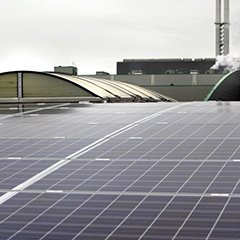-A 320 kilowatt solar energy plant on the roofs of a waste incineration plant
-Photovoltaic systems continue to be attractive for municipal companies
-Q CELLS photovoltaic modules impress with their proven durability, demanding testing procedures and European production
[Cologne / Thalheim, Germany, 7 November 2014] – In a show of its continued dedication to solar energy, the municipal energy and drinking water provider RheinEnergie AG has switched on further photovoltaic solar energy systems. A 320 kilowatt photovoltaic system made of Q CELLS solar modules on the roof of a storage building belonging to the Cologne-based waste disposal and recycling company Abfallentsorgungs- und Verwertungsgesellschaft Köln mbH (AVG Köln) has been connected to the grid. The German-based Hanwha Q CELLS, Europe’s biggest photovoltaic provider, delivered 1,280 high-performance Q.PRO G-3 solar modules with a 250 Wattpeak (Wp) rating for the system. The solar plant will produce approximately 290,000 kilowatt hours of electricity per year which will be completely fed into the public grid. This is enough to power around 90 homes and to prevent approximately 145 tonnes of CO2 emissions each year.
RheinEnergie sees its solar plants’ economic viability to be secured for decades into the future
“We are relying on power from renewable energies and have made it our goal to expand our portfolio of photovoltaic systems”, says Thomas Zerres, head of renewable energies (bio and solar) with RheinEnergie. “In order to secure our solar plants’ economic viability for decades into the future, we are very careful to only use high quality PV modules. The Q CELLS solar modules are produced in Europe. Having seen the results of the demanding VDE tests and in light of their long life, we are impressed.”
The new plant in Niehl is RheinEnergie’s 16th photovoltaic system. Half of those are located in the Cologne municipal area. In total, the systems have a production capacity of 18,065 kilowatts. They prevent 8,805 tonnes of CO2 emissions per year and provide 5,040 households with electricity. Additional systems have been planned. “In collaboration with our affiliate RheinEnergie in the utility group holding company, we are operating the new photovoltaic system and thus making a significant contribution to protecting the climate and saving resources,” explains Andreas Freund, spokesperson for the management of AVG Köln.













